初中英语:只接不定式作宾语的25个常用动词
- 格式:doc
- 大小:35.00 KB
- 文档页数:5

高中英语名师解惑:动词后面,到底是接不定式还是动名词?在学习了不定式和动名词以后,经常有学生问道:“这个动词后面,是接不定式还是动名词??”一般地讲,动词后面接不定式,表示一件具体的事情,或者是还没有做的事情;动词后面接动名词,表示泛指的事情,或者是正在进行的事情。
如果你还在为动词后面到底接不定式还是动名词而发愁?今天这篇内容可一定要认真看了哦!那么,就让我们一起来学习吧!只接不定式(不能接动名词)作宾语的25个常用动词1. want to do sth. 想要做某事I want to buy a new computer this afternoon.我想今天下午买台新电脑。
2. would like to do sth.想要做某事I would like to invite you to come to my birthday party this Saturday.我想邀请你这周六来我的聚会。
3. wish to do sth. 希望做某事I wish to live on the moon one day.我希望有一天在月球上生活。
4. help to do sth. 帮助做某事I often help to do some chores at home.我在家经常帮着做家务。
5. hope to do sth. 希望做某事I hope to have a good rest this weekend.我希望这周末好好休息一下。
6. learn to do sth. 学会做某事He finally learned to play the piano with the help of the teacher.在老师的帮助下,他最终学会了弹钢琴。
7. manage to do sth. 设法做成某事They managed to escape the fire yesterday.昨天他们设法逃脱了火灾。
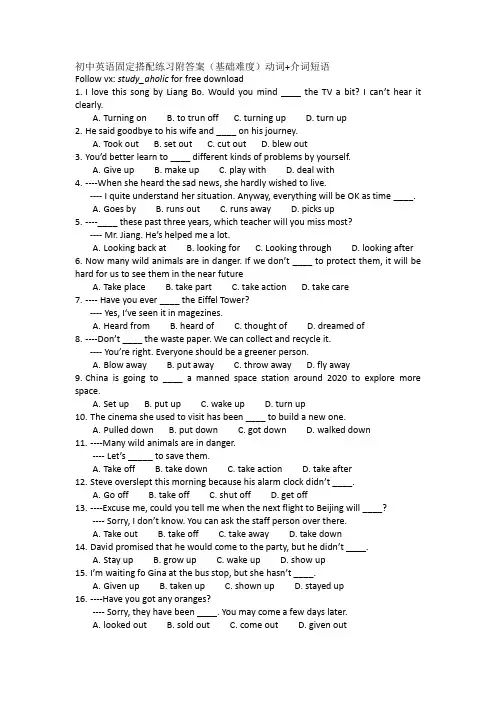
初中英语固定搭配练习附答案(基础难度)动词+介词短语Follow vx: study_aholic for free download1.I love this song by Liang Bo. Would you mind ____ the TV a bit? I can’t hear it clearly.A.Turning onB. to trun offC. turning upD. turn up2.He said goodbye to his wife and ____ on his journey.A.Took outB. set outC. cut outD. blew out3.You’d better learn to ____ different kinds of problems by yourself.A.Give upB. make upC. play withD. deal with4.----When she heard the sad news, she hardly wished to live.---- I quite understand her situation. Anyway, everything will be OK as time ____.A.Goes byB. runs outC. runs awayD. picks up5.----____ these past three years, which teacher will you miss most?---- Mr. Jiang. He’s helped me a lot.A.Looking back atB. looking forC. Looking throughD. looking after6.Now many wild animals are in danger. If we don’t ____ to protect them, it will be hard for us to see them in the near futureA.Take placeB. take partC. take actionD. take care7.---- Have you ever ____ the Eiffel Tower?---- Yes, I‘ve seen it in magezines.A.Heard fromB. heard ofC. thought ofD. dreamed of8.----Don’t ____ the waste paper. We can collect and recycle it.---- You’re right. Everyone should be a greener person.A.Blow awayB. put awayC. throw awayD. fly away9.China is going to ____ a manned space station around 2020 to explore more space.A.Set upB. put upC. wake upD. turn up10.The cinema she used to visit has been ____ to build a new one.A.Pulled downB. put downC. got downD. walked down11.----Many wild animals are in danger.---- Let’s _____ to save them.A.Take offB. take downC. take actionD. take after12.Steve overslept this morning because his alarm clock didn’t ____.A.Go offB. take offC. shut offD. get off13.----Excuse me, could you tell me when the next flight to Beijing will ____?---- Sorry, I don’t know. You can ask the staff person over there.A.Take outB. take offC. take awayD. take down14.David promised that he would come to the party, but he didn’t ____.A.Stay upB. grow upC. wake upD. show up15.I’m waiting fo Gina at the bus stop, but she hasn’t ____.A.Given upB. taken upC. shown upD. stayed up16.----Have you got any oranges?---- Sorry, they have been ____. You may come a few days later.A.looked outB. sold outC. come outD. given out17.How I wished I could sleep longer! However, I had to get up as soon as the alarm clock ____.A.Ran offB. went offC. took offD. put off18.____ your dream, and go for it. I believe you can succeed in the end.A.Hear fromB. take afterC. stick toD. depend on19.The students were _____ three groups when they went on their outing.A.Divided intoB. provided withC. given outD. set up20.---- HI, Tina! What are you going to do for the coming summer holiday?---- I am going to ____ cooking because I like eating delicious food.A.Take downB. take upC. pick upD. clean up21.Jack talked to the shy girl so that she wouldn’t feel _____.A.Took outB. got outC. kept outD. left out22.Teamwork is very important, so we need to _____ when we do something in groups.A.Pull downB. pull togetherC. put togetherD. put down23.I was so careless that I forgot to ____ your letter.A.Sent outB. work outC. come outD. go out24.----Can you show me how to get to the nearest flower store?----- Sure. Go along this street until you ____ a bookstore. The flower stote is next to it.A.Look forB. pass byC. set upD. walk into25.Most of the college students _____ their parents for food and clothing in China.A.Depend onB. wal onC. spend onD. decide on26.Mo Yan, a famous Chinese writer, won the Nobel Prize in Literature at the end of the year 2012. We learn that success ____ the person with a never-give-up attitude.A.Drives outB. takes overC. belongs toD. look up27.You will spend a lot of time _____ the forest.A.Walk acrossB. walking acrossC. walk throughD. walking through28.Happiness has nothing to do with money but ____ your opinions.A.Writes aboutB. depends onC. joins inD. takes up29.My computer doesn’t work again, but my brother can help me _____.A.Fix them upB. fix up themC. fix it upD. fix up it30.The woman _____ all her money to charities to help the poor.A.Gave offB. gave upC. gave awayD. gave in1-5 CBDAA 6-10 CBCAA 11-15 CABDC 16-20 BBCAB 21-25 DBABA 26-30 CDBCC(完整)人教版初中英语动词固定搭配一. 只接不定式(不能接动名词)作宾语的25个常用动词1. want to do sth. 想要做某事I want to buy a new computer this afternoon.I would like to invite you to come to my birthday party this Saturday.3. wish to do sth. 希望做某事I wish to live on the moon one day.4. help to do sth. 帮助做某事I often help to do some chores at home.5. hope to do sth. 希望做某事I hope to have a good rest this weekend.6. learn to do sth. 学会做某事He finally learned to play the piano with the help of the teacher.7. manage to do sth. 设法做成某事They managed to escape the fire yesterday.8. offer to do sth. 主动提出做某事Never offer to teach fish to swim.9. plan to do sth. 计划做某事He plans to travel around the world.10. afford to do sth. 负担得起做某事(时间或金钱方面)We can’t afford to go abroad this summer.11. agree to do sth. 做某事He agreed to do it at once.12. arrange to do sth.安排做某事I arrange to wash clothes tomorrow morning.13. ask to do sth. 要求做某事The boy asks to go to school by bike.14. beg to do sth. 恳求做某事He begged not to be put into prison.15. care to do sth. 愿意/喜欢做某事16. choose to do sth. 选择做某事He chose to believe what she had said.She has decided to travel all over the world.18. demand to do sth. 要求做某事19. determine to do sth. 决心做某事He determined to learn French.20. expect to do sth. 等待做某事I am expecting to hear from you soon.21. fear to do sth. 惧怕做某事She fears to live on the mountain.22. prepare to do sth. 预备做某事They prepared to go hiking this Sunday.23. pretend to do sth. 伪装做某事She pretended not to see me.24. promise to do sth. 答应做某事I have promised to give the children so me books.25. refuse to do sth. 拒绝做某事She refused to buy a new cellphone for her boy.二. 只接动名词(不能接不定式)作宾语的28个常用动词1. practice doing sth. 练习做某事I practice playing the piano twice a week.2. consider doing sth. 考虑做某事I consider waiting a bit longer before I give up.3. enjoy doing sth. 喜欢做某事I enjoy playing basketball.4. finish doing sth. 完成做某事Let's finish doing the work together.5. give up doing sth. 放弃做某事My father has given up smoking.6. imagine doing sth. 想象做某事I can't imagine marrying such a woman.7. keep doing sth. 一直做某事I kept studying English for 1 hour yesterday evening.8. put off doing sth. 推迟做某事Sometimes students put off doing their homework until the last minute.9. risk doing sth. 冒险做某事To win the gamble,he risked losing 100 dollars.10. suggest doing sth. 建议做某事I suggest traveling abroad next month.11. admit doing sth. 承认做某事He admitted making the mistake.12. advise doing sth. 建议做某事He advises going to see a movie.13. allow doing sth. 允许做某事We don't allow smoking in the classroo m.14. appreciate doing sth. 感谢做某事We shall appreciate hearing from you again.15. avoid doing sth. 避免做某事Try to avoid drinking and smoking.16. delay doing sth. 拖延做某事Why have you delayed writing to him?17. deny doing sth. 否认做某事John denied signing the contract.18. discuss doing sth. 讨论做某事I like to discuss doing sports with my friends.19. dislike doing sth. 不喜欢做某事He dislikes dancing in public.20. escape doing sth. 逃脱做某事He escaped being killed.21. excuse doing sth. 原谅做某事He can't excuse coming late for work.22. fancy doing sth. 想象/喜爱做某事Are you fancy buying some food with me?23. forbid doing sth. 禁止做某事They forbid parking here.24. mention doing sth. 提及做某事He mentioned watching TV.25. mind doing sth. 介意做某事Would you mind opening window?26. miss doing sth. 错过做某事The thief missed being caught yesterday.27. permit doing sth. 允许做某事We do not permit smoking in the office.28. prohibit doing sth. 禁止/阻止做某事They prohibit smoking in public.三. 既可接不定式也可接动名词,但含义完全不同的8个动词1. remember to do sth. 记住要做某事(未做)remember doing sth. 记得做过某事(已做)Remember to close the door,please.I remember closing the door.2. forget to do sth. 忘记去做某事(未做)forget doing sth. 忘记做过某事(已做)The light in the office is stil on. He forgot to turn it off.He forgot turning the li ght off.3. regret to do sth. 遗憾要做某事(未做)regret doing sth. 后悔/抱歉做过某事(已做)I regret to tell you that you can't pass the examination.I regret disturbing yo so long.4. try to do sth. 努力做某事try doing sth. 尝试做某事He tries to get the apple above the shelf. But fails to reach it. After a while ,Brown comes in and try showing his ability.5. mean to do sth. 计划做某事mean doing sth. 意味着做某事I meant to go, but my father would not allow me to.Doing that means wasting time.6. can’t help to do sth. 不能帮助做某事I can't help to do such stupid thing.can’t help doing sth. 情不自禁做某事The movie is so funny. I can't help laughing!7. go on to do sth. 继续做另一件事go on doing sth. 继续做同一件事He went on doing his homework in his room after supper.After finishing his homework,he went on to read the text.8. stop to do sth. 停下来去做另一件事stop doing sth. 停下正在做的事情The two girls stopped talking when they saw me.The two girls stopped to talk to me when they saw me.四. 接不定式作宾补的35个常用动词1. advise sb. to do sth. 建议某人做某事2. allow sb. to do sth. 允许某人做某事3. ask sb. to do sth. 请(叫)某人做某事4. bear sb. to do sth. 忍耐某人做某事5. beg sb. to do sth. 恳求某人做某事6. cause sb. to do sth. 导致某人做某事7. command sb. to do sth. 命令某人做某事8. drive sb. to do sth. 驱使某人做某事9. elect sb. to do sth. 选举某人做某事10. encourage sb. to do sth. 鼓舞某人做某事11. expect sb. to do sth. 期望某人做某事12. forbid sb. to do sth. 禁止某人做某事13. force sb. to do sth. 强迫某人做某事14. get sb. to do sth. 使(要)某人做某事15. hate sb. to do sth. 讨厌/厌恶某人做某事16. help sb. to do sth. 帮助某人做某事17. intend sb. to do sth. 打算要某人做某事18. invite sb. to do sth. 邀请某人做某事19. leave sb. to do sth. 留下某人做某事20. like sb. to do sth. 喜欢某人做某事21. mean sb. to do sth. 计划要某人做某事22. need sb. to do sth. 需求某人做某事23. order sb. to do sth. 命令某人做某事24. permit sb. to do sth. 允许某人做某事25. persuade sb. to do sth. 说服某人做某事26. prefer sb. to do sth. 宁愿某人做某事27. request sb. to do sth. 要求某人做某事28. remind sb. to do sth. 提醒某人做某事29. teach sb. to do sth. 教某人做某事30. tell sb. to do sth. 告诉/让某人做某事31. train sb. to do sth. 训练某人做某事32. trouble sb. to do sth. 麻烦某人做某事33. want sb. to do sth. 想要某人做某事34. warn sb. to do sth. 警告某人做某事35. wish sb. to do sth. 希望某人做某事五. 可接动词原形做宾补的11个动词1. see sb. do sth. 看到某人做了某事I saw a big bird fly over the roof of the house yesterday.2. watch sb. do sth. 观看某人做了某事I watched the thief steal money from others' pockets.3. notice sb. do sth. 注意到某人做了某事I noticed him leave the room.4. observe sb. do sth. 观察到某人做了某事He has observed the girl come into the house.5. look at sb. do sth. 看着某人做了某事I looked at him do his homework just now.6. hear sb. do sth. 听到某人做了某事I heard him sing an English song half an hour ago.7. listen to sb. do sth. 听着某人做了某事I listened to him read the passage aloud in English yesterday.8. make sb. do sth. 使某人做某事I made the students elect a monitor.9. let sb. do sth. 让某人做某事Let me help you wash your clothes.10. have sb. do sth. 使某人做某事My mom haves me do some housework every weekend.11. feel sb. do sth. 感觉某人做了某事I felt the rain drop on the roof last night.注意:以上11个动词,也可以接现在分词和过去分词作宾补,但在时间和语态上会有变化,我们以see为例来区分一下。
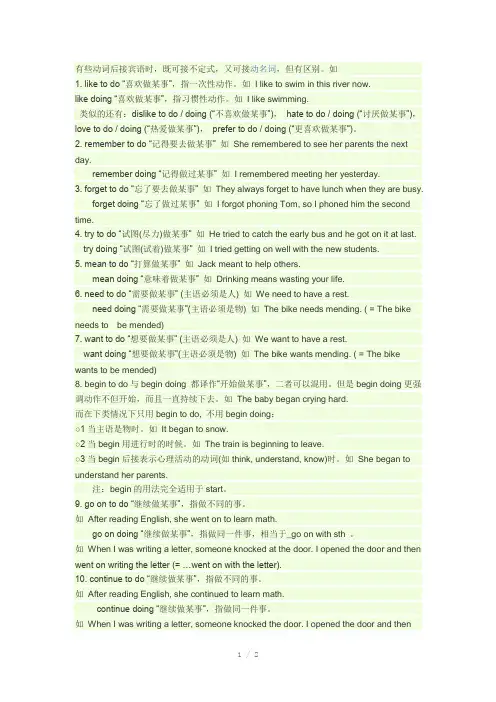
有些动词后接宾语时,既可接不定式,又可接动名词,但有区别。
如1. like to do “喜欢做某事”,指一次性动作。
如I like to swim in this river now.like doing “喜欢做某事”,指习惯性动作。
如I like swimming.类似的还有:dislike to do / doing (“不喜欢做某事”),hate to do / doing (“讨厌做某事”),love to do / doing (“热爱做某事”),prefer to do / doing (“更喜欢做某事”)。
2. remember to do “记得要去做某事” 如She remembered to see her parents the next day.remember doing “记得做过某事” 如I remembered meeting her yesterday.3. forget to do “忘了要去做某事” 如They always forget to have lunch when they are busy.forget doing “忘了做过某事” 如I forgot phoning Tom, so I phoned him the second time.4. try to do “试图(尽力)做某事” 如He tried to catch the early bus and he got on it at last. try doing “试图(试着)做某事” 如I tried getting on well with the new students.5. mean to do “打算做某事” 如Jack meant to help others.mean doing “意味着做某事” 如Drinking means wasting your life.6. need to do “需要做某事” (主语必须是人) 如We need to have a rest.need doing “需要做某事”(主语必须是物) 如The bike needs mending. ( = The bike needs to be mended)7. want to do “想要做某事” (主语必须是人) 如We want to have a rest.want doing “想要做某事”(主语必须是物) 如The bike wants mending. ( = The bike wants to be mended)8. begin to do与begin doing 都译作“开始做某事”,二者可以混用。
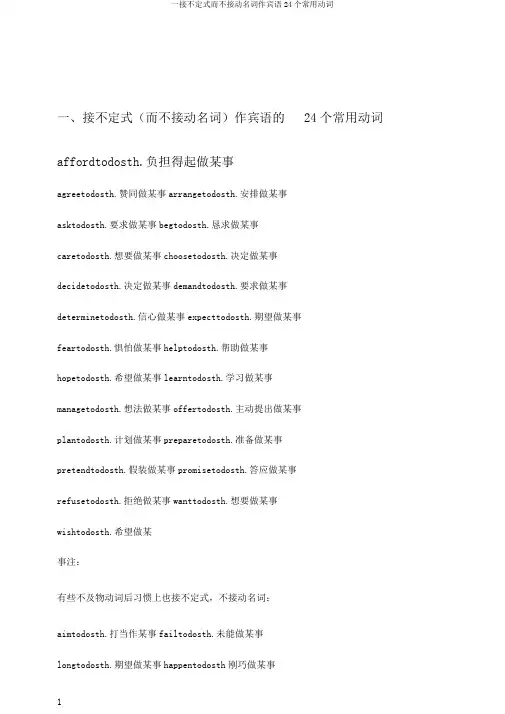
一、接不定式(而不接动名词)作宾语的24个常用动词affordtodosth.负担得起做某事agreetodosth.赞同做某事arrangetodosth.安排做某事asktodosth.要求做某事begtodosth.恳求做某事caretodosth.想要做某事choosetodosth.决定做某事decidetodosth.决定做某事demandtodosth.要求做某事determinetodosth.信心做某事expecttodosth.期望做某事feartodosth.惧怕做某事helptodosth.帮助做某事hopetodosth.希望做某事learntodosth.学习做某事managetodosth.想法做某事offertodosth.主动提出做某事plantodosth.计划做某事preparetodosth.准备做某事pretendtodosth.假装做某事promisetodosth.答应做某事refusetodosth.拒绝做某事wanttodosth.想要做某事wishtodosth.希望做某事注:有些不及物动词后习惯上也接不定式,不接动名词:aimtodosth.打当作某事failtodosth.未能做某事longtodosth.期望做某事happentodosth刚巧做某事hesitatetodosth.踌躇做某事struggletodosth.努力做某事二、接不定式作宾补的36个常用动词1/10注:不要受汉语意思的影响而误用以下动词句型:汉语的“谅解某人做某事”,英语可说成excuse[forgive]sb.fordoingsth.。
汉语的“希望某人做某事”,英语可说成wishsb.todosth.不可以说成hopesbtodosth。
汉语的“建议某人做某事”,英语可说成advisesb.todosth.不可以说成suggestsb.todosth。
汉语的“安排某人做某事”,英语可说成arrangeforsb.todosth.。
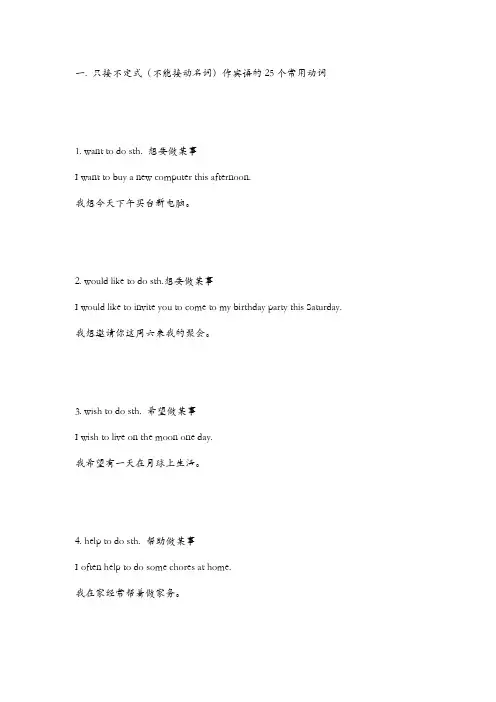
一. 只接不定式(不能接动名词)作宾语的25个常用动词1. want to do sth. 想要做某事I want to buy a new computer this afternoon.我想今天下午买台新电脑。
2. would like to do sth.想要做某事I would like to invite you to come to my birthday party this Saturday. 我想邀请你这周六来我的聚会。
3. wish to do sth. 希望做某事I wish to live on the moon one day.我希望有一天在月球上生活。
4. help to do sth. 帮助做某事I often help to do some chores at home.我在家经常帮着做家务。
5. hope to do sth. 希望做某事I hope to have a good rest this weekend.我希望这周末好好休息一下。
6. learn to do sth. 学会做某事He finally learned to play the piano with the help of the teacher. 在老师的帮助下,他最终学会了弹钢琴。
7. manage to do sth. 设法做成某事They managed to escape the fire yesterday.昨天他们设法逃脱了火灾。
8. offer to do sth. 主动提出做某事Never offer to teach fish to swim.别在强人面前逞能。
9. plan to do sth. 计划做某事He plans to travel around the world.他计划要周游世界。
10. afford to do sth. 负担得起做某事(时间或金钱方面)We can’t afford to go abroad this summer.今年夏天我们没有足够的钱出国。
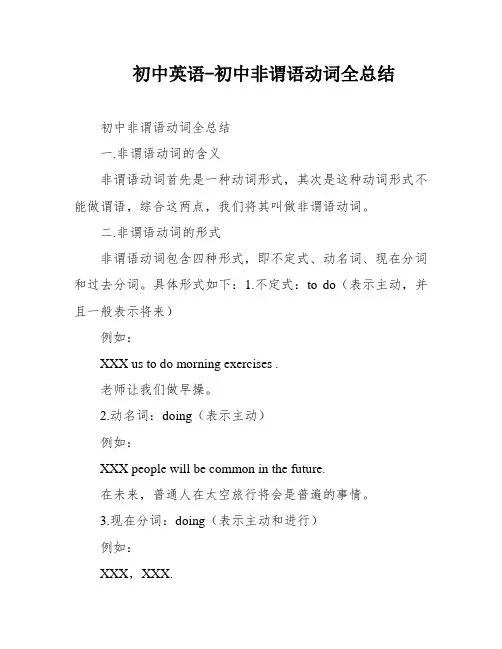
初中英语-初中非谓语动词全总结初中非谓语动词全总结一.非谓语动词的含义非谓语动词首先是一种动词形式,其次是这种动词形式不能做谓语,综合这两点,我们将其叫做非谓语动词。
二.非谓语动词的形式非谓语动词包含四种形式,即不定式、动名词、现在分词和过去分词。
具体形式如下:1.不定式:to do(表示主动,并且一般表示将来)例如:XXX us to do morning exercises .老师让我们做早操。
2.动名词:doing(表示主动)例如:XXX people will be common in the future.在未来,普通人在太空旅行将会是普遍的事情。
3.现在分词:doing(表示主动和进行)例如:XXX,XXX.他坐在那边,读着一张报纸。
4.曩昔分词:done及物动词的过去分词表示被动或完成;不及物动词的过去分词表示主动或完成。
polluted river被污染的河流(及物动词pollute和river之间是被动关系,即“河流被污染”)XXX落叶(不及物动词fall和leaves之间是主动关系,即“叶子落下来”)注意:非谓语动词本身不能表示现在和过去。
非谓语动词表示进行和将来是相对于谓语动作来说的:和谓语动作同时发生表示进行;发生在谓语动作之后表示将来三.非谓语动词的作用非谓语动词除去不克不及做谓语以外,其它一切身分都能够做。
详细如下。
1.不定式:做主语、宾语、表语、定语、状语和补语。
To learn a foreign language is difficult .(作主语)学会一门外语是很难的。
It’s easy to see their aunt.(作真正主语,it做形式主语)很容易见到他们的姑姑。
Tom wanted to have a cup of beer.(作宾语)XXX想要喝杯啤酒。
His wish is to be a driver.(作表语)他的愿望是当一名司机。
I have nothing to say.(作定语)我没有什么可说的。
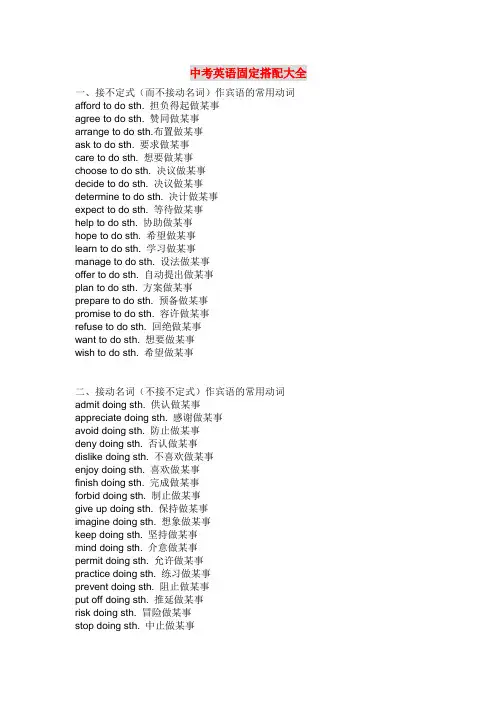
中考英语固定搭配大全一、接不定式(而不接动名词)作宾语的常用动词afford to do sth. 担负得起做某事agree to do sth. 赞同做某事arrange to do sth.布置做某事ask to do sth. 要求做某事care to do sth. 想要做某事choose to do sth. 决议做某事decide to do sth. 决议做某事determine to do sth. 决计做某事expect to do sth. 等待做某事help to do sth. 协助做某事hope to do sth. 希望做某事learn to do sth. 学习做某事manage to do sth. 设法做某事offer to do sth. 自动提出做某事plan to do sth. 方案做某事prepare to do sth. 预备做某事promise to do sth. 容许做某事refuse to do sth. 回绝做某事want to do sth. 想要做某事wish to do sth. 希望做某事二、接动名词(不接不定式)作宾语的常用动词admit doing sth. 供认做某事appreciate doing sth. 感谢做某事avoid doing sth. 防止做某事deny doing sth. 否认做某事dislike doing sth. 不喜欢做某事enjoy doing sth. 喜欢做某事finish doing sth. 完成做某事forbid doing sth. 制止做某事give up doing sth. 保持做某事imagine doing sth. 想象做某事keep doing sth. 坚持做某事mind doing sth. 介意做某事permit doing sth. 允许做某事practice doing sth. 练习做某事prevent doing sth. 阻止做某事put off doing sth. 推延做某事risk doing sth. 冒险做某事stop doing sth. 中止做某事suggest doing sth. 建议做某事三、接动词原形作宾补的常用动词hear sb. do sth. 听见某人做某事let sb. do sth.让某人做某事listen to sb. do sth. 听着某人做某事look at sb. do sth. 看着某人做某事make sb. do sth. 使某人做某事see sb. do sth. 看见某人做某事watch sb. do sth. 察看某人做某事四、接不定式或动名词作宾语意思相反动词like to do sth / like doing sth. 喜欢做某事love to do sth / love doing sth. 喜欢做某事hate to do sth / hate doing sth. 憎恶做某事prefer to do sth / prefer doing sth. 宁可做某事begin to do sth / begin doing sth. 开端做某事start to do sth / start doing sth. 开端做某事continue to do sth / continue doing sth. 持续做某事七、接不定式或动名词作宾语意思不同的7个动词(1) remember to do sth. 记住要做某事remember doing sth. 记住曾做过某事(2) forget to do sth. 遗忘要做某事forget doing sth. 遗忘曾做过某事(3) regret to do sth. 懊悔(遗憾)要做某事regret doing sth. 懊悔(遗憾)曾做过某事(4) try to do sth. 设法要做某事try doing sth. 做某事试试看有何效果(5) mean to do sth. 计划做某事mean doing sth. 意味着做某事(6) can’t help to do sth. 不能协助做某事can’t help doing sth. 禁不住做某事(7) go on to do sth. 做完某预先接着做另一事go on doing sth. 持续做不断在做的事注:stop to do sth. 与stop doing sth.也不同,前者指停上去去做某事,后者指中止正在做的事,但001. a bottle/glass/cup… of 一瓶/茶杯/玻璃杯002. a few 一些003. a kind of 一种;一类004. a little 一点;少量005. a lot of…(lots of…) 许多的006. a moment later 片刻之后007. a number of 若干的;许多的008. a pair of 一双;一副009. a piece of 一块(张;片;只)010. all day(long) 整天;一天到晚011. all kinds of 各种各样012. all one’s life一生;终生013. all over 到处;结束014. all over the world 全世界015. all right 行了;好吧;(病)好了016. all the same 仍然017. all the time ①一直;始终②老是(美国英语)018. arrive at/in 到达某地019. as…as… 一样020. as…as one can(=as…as possible) 尽量021. as soon as 一就022. at breakfast 早餐时023. at first 起先;开始的时候024. at home 在家025. at last 最后;终于026. at night 在夜里027. at noon 在正午028. at once 立刻;马上029. at school 在学校上课030. at the back of 在……的后面031. at the head of 在……的前面032. at the moment 此刻033. at the same time 同时034. at this time of (the) year 在(一年中)这个时节里035. at times 时常;有时036. at work 在工作037. be able to do sth. (= can+V.) 能够038. be angry with sb. 生某人的起be angry at/about sth. 生某事的气039. be born 出生040. be different from… 和……不同041. be full of 充满着……042. be good at 善于be bad at拙于043. be good for 对……有益的be bad for 对……有害的044. be in hospital 生病;住院be in the hospital 在医院045. be late for 迟到046. be like 像047. be made of (be made from) ……制的;用…….制成的048. be/get ready 准备好049. be sure 肯定;确定050. break down ①(机械)损坏②拆散(某物)051. by+交通工具搭乘某交通工具052. by the way 顺便一提053. by then 到那时054. catch (a) cold; have a cold 感冒055. change one’s mind 改变想法(注意)056. come back 回来057. come down 下来058. come from ①出生于②来自于059. come in 进入;进来come out 出来060. come over 过来;顺便来访061. come around (走)过来(绕行而来)062. day after day 日复一日地;天天063. do(es) +V.ing 做某事064. do sport 运动;参加(体育)运动065. does well ①做得很好②成功③成绩很好066. each other 互相067. eat up 吃完068. either…or… 不是……就是069. enjoy oneself 过得愉快070. fall behind 落后;跟不上071. fall off ①跌落;掉下②(质或量)下降072. far away 遥远073. feel like doing sth. 想要做某事074. feel tired 感到疲劳075. find out 查明;发现;了解076. from now on 从今以后;今后077. from … to … 从……到……078. get back ①返回②取回079. get down ①下来;落下②记下来080. get dressed 穿衣服081. get home 大家082. get into ①进入②搭乘(出租车)③陷入(坏的情况)083. get off ①下车②起飞084. get on ①上车②生活085. get on (with…)= get along (with…) ①生活②与(某人)相处③(活动)有进展086. get out of ①从......出来②从出租车(轿车)下来087. get ready to do sth. 准备做某事088. get up ①起床②起立089. get warm (long) 变暖和(长)090. give a call 给……打电话091. give back 归还;送回092. go back 回去093. go for a walk 散步094. go home 回家095. go on 继续096. go shopping 去购物097. go to bed 睡觉(并未入睡)098. go to school 上学099. go to sleep 入睡;睡着100. go to the cinema 看电影101. grow up 成年;长大成人102. half an hour 半小时103. have a drink of 喝一点……104. have good time 玩得很高兴;过得愉快105. have a look (at) 看一看106. have a match 比赛have a test 测验107. have a meeting 开会108. have a rest 休息109. have a swim 游泳110. have a talk 谈话111. have a walk 散步112. have a wash 洗(手,脸等)113. have breakfast 吃早饭114. have lessons/classes 上课115. have lunch 吃午饭116. have sport 进行体育活动117. have supper 吃晚饭118. have to 不得不;必须119. hear from+sb. 收到某人的来信120. hear of 听说121. help sb. with sth 在某事上帮某人help sb. (to) do sth. 帮助某人做某事122. hold a meeting (= have a meeting) 举行会议123. hold on ①等一等(别挂电话)②坚持;持续124. hour after hour 一小时又一小时地;持续地125. how long ①(时间)多长;多长②(长度)多长126. how many/much 多少/多少(钱)127. how often 多久;多常128. how old 几岁;多大(年纪)129. hundreds of 数百130. hurry of 匆匆离去;赶快去131. hurry up 赶快132. in a minute 一会儿;立刻133. in bed 躺在床上134. in English 用英语(说)135. in front 在前方(面);在正对面136. in front of 在......前面137. in time 正好;及时138. in the middle of 在……中间139. jump into 跳进……140. just a moment 等一会儿141. just then 正在那时142. keep busy (一直)忙碌143. last year 去年144. later on 过后;以后145. laugh at 嘲笑146. listen to 听……(讲话)147. look after 照料;照顾148. look at (注视着)看;观看149. look for 寻找150. look into 往……里看151. look like 看起来像152. look over (医生)检查153. look the same 看起来很像154. lots of 许多;很多;大量155. make friends with 与……交朋友156. make sure 务必157. middle school 中学158. move away 搬开;搬走159. move to 搬到160. neither… nor… 既不……也不161. never mind 不要紧;没关系162. next time 下次163. no longer (=not…any longer) 不再164. not … at all 一点也不;根本不(用来加强not的语气)165. not at all 不用谢;别客气166. not so … as 不像;不如167. on foot 走路;步行168. on show 展览;被陈列着169. on the earth 在地球上170. on the (one’s) way 在途中;在路上171. on time 按时;准时172. out of 在……之外;从……里头173. over there 在那边;在对面174. Party member 共产党员175. pass on 传递176. pay for付钱;支付;付出代价177. play with 玩耍178. post office 邮局179. pull out 扑灭/ put off 推迟脱下180. pull …up from 把……从……拉上来181. put on 穿;戴上;增加182. right away 立刻;马上183. right now 现在;刚刚184. send away 撵走;开除;解雇185. send up 发射186. sit down 坐下187. so …that 如此……以致……188. speak to sb. 与……佳话189. spend some time on 在……花时间190. stop sb. from doing sth. 阻止某人做某事191. take a rest 休息192. take a walk 散步193. take away 拿走194. take down 取下195. take exercise 锻炼(身体)196. take off 脱掉衣物197. take one’s time ①不急;慢慢干②用去(某人)时间198. take part in 参加199. take/have some medicine 服药200. take the train/a boat/a bus…坐火车/船/公共汽车…… 201. talk about 谈论202. talk to 与……谈话203. teach oneself 自学204. tell (sb.) about 告诉(某人)……205. the other(s) 另一个(其他的)206. think about 考虑(是否去做)207. too …to 太……不能……208. try on 试穿;试试看209. turn green 变绿210. turn off 关掉(自来水,电灯,收音机等)211. turn on 开;旋开(电灯,无线电等)212. up and down 上上下下;来回地213. very much 很;非常214. wait for 等候;等待215. wear out 穿坏;穿旧;用尽216. with one’s help 在(某人)帮助下217. work on ①从事……工作②继续工作③研究218. worry about 担心;着急219. write down 写下;记下(完整)人教版初中英语动词固定搭配一. 只接不定式(不能接动名词)作宾语的25个常用动词1. want to do sth. 想要做某事I want to buy a new computer this afternoon.2. would like to do sth.想要做某事I would like to invite you to come to my birthday party this Saturday.3. wish to do sth. 希望做某事I wish to live on the moon one day.4. help to do sth. 帮助做某事I often help to do some chores at home.5. hope to do sth. 希望做某事I hope to have a good rest this weekend.6. learn to do sth. 学会做某事He finally learned to play the piano with the help of the teacher.7. manage to do sth. 设法做成某事They managed to escape the fire yesterday.8. offer to do sth. 主动提出做某事Never offer to teach fish to swim.9. plan to do sth. 计划做某事He plans to travel around the world.10. afford to do sth. 负担得起做某事(时间或金钱方面)We can’t afford to go abroad this summer.11. agree to do sth. 做某事He agreed to do it at once.12. arrange to do sth.安排做某事I arrange to wash clothes tomorrow morning.The boy asks to go to school by bike.14. beg to do sth. 恳求做某事He begged not to be put into prison.15. care to do sth. 愿意/喜欢做某事16. choose to do sth. 选择做某事He chose to believe what she had said.17. decide to do sth. 决定做某事She has decided to travel all over the world.18. demand to do sth. 要求做某事19. determine to do sth. 决心做某事He determined to learn French.20. expect to do sth. 等待做某事I am expecting to hear from you soon.21. fear to do sth. 惧怕做某事She fears to live on the mountain.22. prepare to do sth. 预备做某事They prepared to go hiking this Sunday.23. pretend to do sth. 伪装做某事She pretended not to see me.24. promise to do sth. 答应做某事I have promised to give the children some books.25. refuse to do sth. 拒绝做某事She refused to buy a new cellphone for her boy.二. 只接动名词(不能接不定式)作宾语的28个常用动词1. practice doing sth. 练习做某事I practice playing the piano twice a week.2. consider doing sth. 考虑做某事I consider waiting a bit longer before I give up.I enjoy playing basketball.4. finish doing sth. 完成做某事Let's finish doing the work together.5. give up doing sth. 放弃做某事My father has given up smoking.6. imagine doing sth. 想象做某事I can't imagine marrying such a woman.7. keep doing sth. 一直做某事I kept studying English for 1 hour yesterday evening.8. put off doing sth. 推迟做某事Sometimes students put off doing their homework until the last minute.9. risk doing sth. 冒险做某事To win the gamble,he risked losing 100 dollars.10. suggest doing sth. 建议做某事I suggest traveling abroad next month.11. admit doing sth. 承认做某事He admitted making the mistake.12. advise doing sth. 建议做某事He advises going to see a movie.13. allow doing sth. 允许做某事We don't allow smoking in the classroom.14. appreciate doing sth. 感谢做某事We shall appreciate hearing from you again.15. avoid doing sth. 避免做某事Try to avoid drinking and smoking.16. delay doing sth. 拖延做某事Why have you delayed writing to him?17. deny doing sth. 否认做某事John denied signing the contract.18. discuss doing sth. 讨论做某事I like to discuss doing sports with my friends.19. dislike doing sth. 不喜欢做某事He dislikes dancing in public.20. escape doing sth. 逃脱做某事He escaped being killed.21. excuse doing sth. 原谅做某事He can't excuse coming late for work.22. fancy doing sth. 想象/喜爱做某事Are you fancy buying some food with me?23. forbid doing sth. 禁止做某事They forbid parking here.24. mention doing sth. 提及做某事He mentioned watching TV.25. mind doing sth. 介意做某事Would you mind opening window?26. miss doing sth. 错过做某事The thief missed being caught yesterday.27. permit doing sth. 允许做某事We do not permit smoking in the office.28. prohibit doing sth. 禁止/阻止做某事They prohibit smoking in public.三. 既可接不定式也可接动名词,但含义完全不同的8个动词1. remember to do sth. 记住要做某事(未做)remember doing sth. 记得做过某事(已做)Remember to close the door,please.I remember closing the door.2. forget to do sth. 忘记去做某事(未做)forget doing sth. 忘记做过某事(已做)The light in the office is stil on. He forgot to tu rn it off.He forgot turning the light off.3. regret to do sth. 遗憾要做某事(未做)regret doing sth. 后悔/抱歉做过某事(已做)I regret to tell you that you can't pass the examination.I regret disturbing yo so long.4. try to do sth. 努力做某事try doing sth. 尝试做某事He tries to get the apple above the shelf. But fails to reach it. After a while ,Brown comes in and try showing his ability.5. mean to do sth. 计划做某事mean doing sth. 意味着做某事I meant to go, but my father would not allow me to.Doing that means wasting time.6. can’t help to do sth. 不能帮助做某事I can't help to do such stupid thing.can’t help doing sth. 情不自禁做某事The movie is so funny. I can't help laughing!7. go on to do sth. 继续做另一件事go on doing sth. 继续做同一件事He went on doing his homework in his room after supp er.After finishing his homework,he went on to read the text.8. stop to do sth. 停下来去做另一件事stop doing sth. 停下正在做的事情The two girls stopped talking when they saw me.The two girls stopped to talk to me when they saw me.四. 接不定式作宾补的35个常用动词1. advise sb. to do sth. 建议某人做某事2. allow sb. to do sth. 允许某人做某事3. ask sb. to do sth. 请(叫)某人做某事5. beg sb. to do sth. 恳求某人做某事6. cause sb. to do sth. 导致某人做某事7. command sb. to do sth. 命令某人做某事8. drive sb. to do sth. 驱使某人做某事9. elect sb. to do sth. 选举某人做某事10. encourage sb. to do sth. 鼓舞某人做某事11. expect sb. to do sth. 期望某人做某事12. forbid sb. to do sth. 禁止某人做某事13. force sb. to do sth. 强迫某人做某事14. get sb. to do sth. 使(要)某人做某事15. hate sb. to do sth. 讨厌/厌恶某人做某事16. help sb. to do sth. 帮助某人做某事17. intend sb. to do sth. 打算要某人做某事18. invite sb. to do sth. 邀请某人做某事19. leave sb. to do sth. 留下某人做某事20. like sb. to do sth. 喜欢某人做某事21. mean sb. to do sth. 计划要某人做某事22. need sb. to do sth. 需求某人做某事23. order sb. to do sth. 命令某人做某事24. permit sb. to do sth. 允许某人做某事25. persuade sb. to do sth. 说服某人做某事26. prefer sb. to do sth. 宁愿某人做某事27. request sb. to do sth. 要求某人做某事28. remind sb. to do sth. 提醒某人做某事29. teach sb. to do sth. 教某人做某事30. tell sb. to do sth. 告诉/让某人做某事31. train sb. to do sth. 训练某人做某事32. trouble sb. to do sth. 麻烦某人做某事34. warn sb. to do sth. 警告某人做某事35. wish sb. to do sth. 希望某人做某事五. 可接动词原形做宾补的11个动词1. see sb. do sth. 看到某人做了某事I saw a big bird fly over the roof of the house yesterday.2. watch sb. do sth. 观看某人做了某事I watched the thief steal money from others' pockets.3. notice sb. do sth. 注意到某人做了某事I noticed him leave the room.4. observe sb. do sth. 观察到某人做了某事He has observed the girl come into the house.5. look at sb. do sth. 看着某人做了某事I looked at him do his homework just now.6. hear sb. do sth. 听到某人做了某事I heard him sing an English song half an hour ago.7. listen to sb. do sth. 听着某人做了某事I listened to him read the passage aloud in English yesterday.8. make sb. do sth. 使某人做某事I made the students elect a monitor.9. let sb. do sth. 让某人做某事Let me help you wash your clothes.10. have sb. do sth. 使某人做某事My mom haves me do some housework every weekend.11. feel sb. do sth. 感觉某人做了某事I felt the rain drop on the roof last night.注意:以上11个动词,也可以接现在分词和过去分词作宾补,但在时间和语态上会有变化,我们以see为例来区分一下。
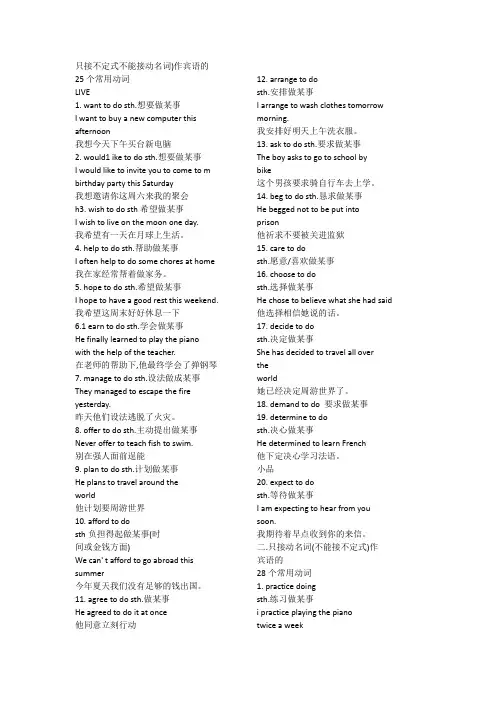
只接不定式不能接动名词)作宾语的25个常用动词LIVE1. want to do sth.想要做某事I want to buy a new computer this afternoon我想今天下午买台新电脑2. would1 ike to do sth.想要做某事I would like to invite you to come to m birthday party this Saturday我想邀请你这周六来我的聚会h3. wish to do sth希望做某事I wish to live on the moon one day.我希望有一天在月球上生活。
4. help to do sth.帮助做某事I often help to do some chores at home 我在家经常帮着做家务。
5. hope to do sth.希望做某事I hope to have a good rest this weekend.我希望这周末好好休息一下6.1 earn to do sth.学会做某事He finally learned to play the piano with the help of the teacher.在老师的帮助下,他最终学会了弹钢琴7. manage to do sth.设法做成某事They managed to escape the fire yesterday.昨天他们设法逃脱了火灾。
8. offer to do sth.主动提出做某事Never offer to teach fish to swim.别在强人面前逞能9. plan to do sth.计划做某事He plans to travel around theworld他计划要周游世界10. afford to dosth负担得起做某事(时间或金钱方面)We can' t afford to go abroad this summer今年夏天我们没有足够的钱出国。
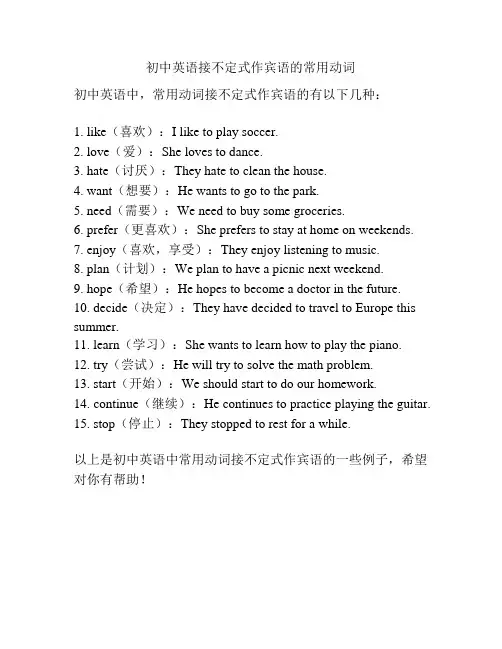
初中英语接不定式作宾语的常用动词初中英语中,常用动词接不定式作宾语的有以下几种:1. like(喜欢):I like to play soccer.2. love(爱):She loves to dance.3. hate(讨厌):They hate to clean the house.4. want(想要):He wants to go to the park.5. need(需要):We need to buy some groceries.6. prefer(更喜欢):She prefers to stay at home on weekends.7. enjoy(喜欢,享受):They enjoy listening to music.8. plan(计划):We plan to have a picnic next weekend.9. hope(希望):He hopes to become a doctor in the future.10. decide(决定):They have decided to travel to Europe this summer.11. learn(学习):She wants to learn how to play the piano.12. try(尝试):He will try to solve the math problem.13. start(开始):We should start to do our homework.14. continue(继续):He continues to practice playing the guitar.15. stop(停止):They stopped to rest for a while.以上是初中英语中常用动词接不定式作宾语的一些例子,希望对你有帮助!。
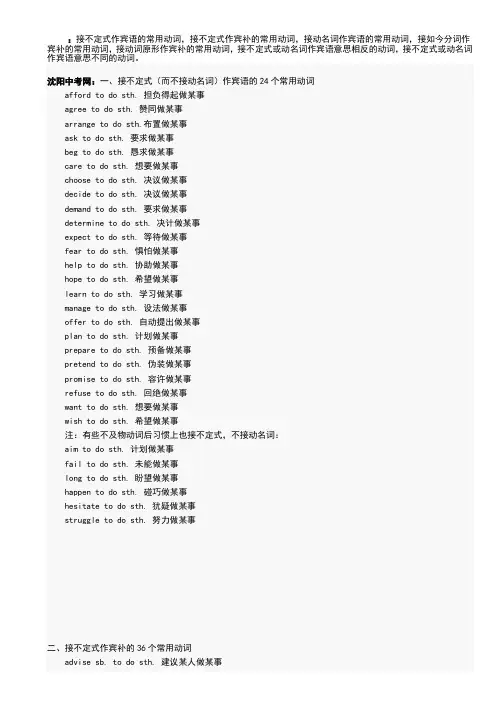
:接不定式作宾语的常用动词,接不定式作宾补的常用动词,接动名词作宾语的常用动词,接如今分词作宾补的常用动词,接动词原形作宾补的常用动词,接不定式或动名词作宾语意思相反的动词,接不定式或动名词作宾语意思不同的动词。
沈阳中考网:一、接不定式(而不接动名词)作宾语的24个常用动词afford to do sth. 担负得起做某事agree to do sth. 赞同做某事arrange to do sth.布置做某事ask to do sth. 要求做某事beg to do sth. 恳求做某事care to do sth. 想要做某事choose to do sth. 决议做某事decide to do sth. 决议做某事demand to do sth. 要求做某事determine to do sth. 决计做某事expect to do sth. 等待做某事fear to do sth. 惧怕做某事help to do sth. 协助做某事hope to do sth. 希望做某事learn to do sth. 学习做某事manage to do sth. 设法做某事offer to do sth. 自动提出做某事plan to do sth. 计划做某事prepare to do sth. 预备做某事pretend to do sth. 伪装做某事promise to do sth. 容许做某事refuse to do sth. 回绝做某事want to do sth. 想要做某事wish to do sth. 希望做某事注:有些不及物动词后习惯上也接不定式,不接动名词:aim to do sth. 计划做某事fail to do sth. 未能做某事long to do sth. 盼望做某事happen to do sth. 碰巧做某事hesitate to do sth. 犹疑做某事struggle to do sth. 努力做某事二、接不定式作宾补的36个常用动词advise sb. to do sth. 建议某人做某事allow sb. to do sth. 允许某人做某事ask sb. to do sth.请(叫)某人做某事bear sb. to do sth.忍耐某人做某事beg sb. to do sth. 恳求某人做某事cause sb. to do sth. 招致某人做某事command sb. to do sth. 命令某人做某事drive sb. to do sth .驱使某人做某事elect sb. to do sth. 选举某人做某事encourage sb. to do sth. 鼓舞某人做某事expect sb. to do sth. 希冀某人做某事forbid sb. to do sth. 制止某人做某事force sb. to do sth. 强迫某人做某事get sb. to do sth. 使(要)某人做某事hate sb. to do sth. 厌恶某人做某事help sb. to do sth. 协助某人做某事intend sb. to do sth. 计划要某人做某事invite sb. to do sth. 约请某人做某事leave sb. to do sth. 留下某人做某事like sb. to do sth. 喜欢某人做某事mean sb. to do sth. 计划要某人做某事need sb. to do sth. 需求某人做某事oblige sb. to do sth. 迫使某人做某事order sb. to do sth. 命令某人做某事permit sb. to do sth. 允许某人做某事persuade sb. to do sth. 压服某人做某事prefer sb. to do sth. 宁愿某人做某事request sb. to do sth. 要求某人做某事 remind sb. to do sth. 提示某人做某事 teach sb. to do sth .教某人做某事tell sb. to do sth. 通知某人做某事 train sb. to do sth. 训练某人做某事trouble sb. to do sth. 费事某人做某事want sb. to do sth. 想要某人做某事warn sb. to do sth. 正告某人做某事wish sb. to do sth. 希望某人做某事注:不要受汉语意思的影响:汉语的“原谅某人做某事”,英语可说成excuse [forgive] sb. for doing sth.。
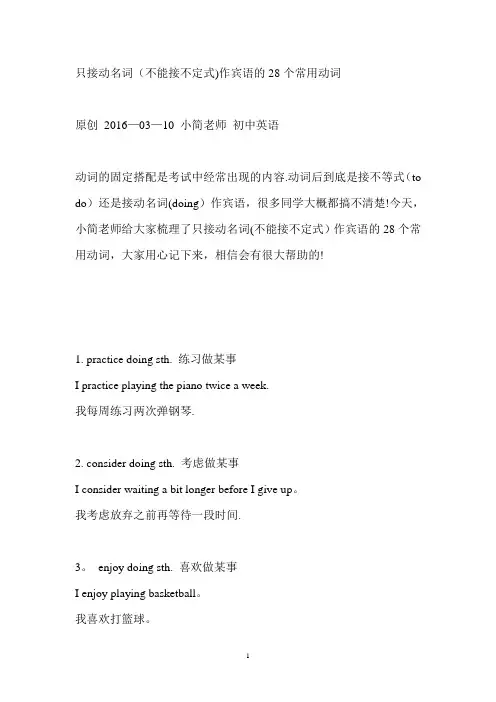
只接动名词(不能接不定式)作宾语的28个常用动词原创2016—03—10 小简老师初中英语动词的固定搭配是考试中经常出现的内容.动词后到底是接不等式(to do)还是接动名词(doing)作宾语,很多同学大概都搞不清楚!今天,小简老师给大家梳理了只接动名词(不能接不定式)作宾语的28个常用动词,大家用心记下来,相信会有很大帮助的!1. practice doing sth. 练习做某事I practice playing the piano twice a week.我每周练习两次弹钢琴.2. consider doing sth. 考虑做某事I consider waiting a bit longer before I give up。
我考虑放弃之前再等待一段时间.3。
enjoy doing sth. 喜欢做某事I enjoy playing basketball。
我喜欢打篮球。
4。
finish doing sth。
完成做某事Let’s finish doing the work together。
让我们一起完成工作吧。
5。
give up doing sth。
放弃做某事My father has given up smoking.我爸爸已经戒烟了。
6. imagine doing sth. 想象做某事I can’t imagine marrying such a woman。
我不能想象娶了这样一个女人。
7。
keep doing sth。
一直做某事I kept studying English for 1 hour yesterday evening。
昨天晚上,我一直学了1小时英语.8. put off doing sth. 推迟做某事Sometimes students put off doing their homework until the last minute。
有时学生们会拖延到最后一分钟才做作业。
一。
只接不定式(不能接动名词)作宾语得25个常用动词1、wanttodosth。
想要做某事I want tobuy a new computer thisafternoon。
我想今天下午买台新电脑。
2。
would like to do sth.想要做某事I would like toinvite you toe to my birthdaypartythisSaturday。
我想邀请您这周六来我得聚会、3。
wish todo sth、希望做某事I wish tolive onthe moon oneday。
我希望有一天在月球上生活。
4。
help todo sth、帮助做某事I oftenhelp to dosome choresat home.我在家经常帮着做家务。
5、hope to do sth。
希望做某事I hope to havea goodrest this weekend、我希望这周末好好休息一下。
6. learn to do sth、学会做某事He finallylearned to play the piano with thehelp ofthe teacher.在老师得帮助下,她最终学会了弹钢琴。
7。
manage to do sth. 设法做成某事Theymanaged to escapethefire yesterday。
昨天她们设法逃脱了火灾。
8.offer todo sth、主动提出做某事Neverofferto teachfish to swim。
别在强人面前逞能。
9. plan to do sth、计划做某事He plansto travel around theworld。
她计划要周游世界。
10. afford to do sth、负担得起做某事(时间或金钱方面)Wecan'tafford to goabroad thissummer.今年夏天我们没有足够得钱出国。
初中英语动词固定搭配---只接不定式(不能接动名词)作宾语的25个常用动词只接不定式(不能接动名词)作宾语的25个常用动词1. want to do sth. 想要做某事例句:I want to buy a new computer this afternoon.我想今天下午买台新电脑。
2.would like to do sth.想要做某事例句:I would like to invite you to come to my birthday party thisFriday.我想邀请你这周五来我的聚会。
3.wish to do sth. 希望做某事例句:I wish to live on the moon one day.我希望有一天在月球上生活。
4.help to do sth. 帮助做某事例句:I often help to do some chores at home.我在家经常帮着做家务。
5.hope to do sth. 希望做某事例句:I hope to have a good rest this weekend.我希望这周末好好休息一下。
6. learn to do sth. 学会做某事He finally learned to play the piano with the help of the teacher.在老师的帮助下,他最终学会了弹钢琴。
7. manage to do sth. 设法做成某事They managed to escape the fire yesterday.昨天他们设法逃脱了火灾。
8. offer to do sth. 主动提出做某事Never offer to teach fish to swim.别在强人面前逞能。
9. plan to do sth. 计划做某事He plans to travel around the world.他计划要周游世界。
习惯上接不定式或动名词作宾语的常用动词1. 习惯上接不定式作宾语的动词英语中有些动词后接另一个动词作宾语时,用作宾语的动词习惯要用不定式,而不用动名词,这类动词主要afford(负担得起), agree(同意), apply(申请), arrange(安排), ask(要求), care(想要), choose(决定), decide(决定), demand(要求), determine(决心), expect(期待), help(帮助), hope(希望), manage(设法), offer(主动提出), plan(计划), prepare(准备), pretend(假装), promise(答应), refuse(拒绝), want(想要), wish(希望)等。
如:Less and less people can afford to go abroad for their holidays. 花得起钱去国外度假的人越来越少了。
He agreed to help but backed out when he found how difficult it was. 他本来同意给予帮助的,但在发现事情有多么困难之后就打退堂鼓了。
Bill applied to join the police last week, but he wasn’t tall enough. 比尔上星期申请参加警察部队,但是他不够高。
We arranged to meet at the station but she didn’t turn up. 我们商量好在车站见面,可是她没有露面。
There have been fewer problems for travellers who chose to fly. 对于选择乘飞机旅游的人来说问题更少。
He decided to put an advertisement in the newspapers. 他决定在报上登一份广告。
只接不定式、不接动名词作宾语的25个动词动词的固定搭配是考试中经常出现的内容。
动词后到底是接不等式(to do)还是接动名词(doing)作宾语,很多同学大概都搞不清楚!今天,小编给大家梳理了只接不定式(而不接动名词)作宾语的25个常用动词,大家用心记下来,相信会有很大帮助的!1. want to do sth. 想要做某事I want to buy a new computer this afternoon.我想今天下午买台新电脑。
2. would like to do sth.想要做某事I would like to invite you to come to my birthday party this Saturday. 我想邀请你这周六来我的聚会。
3. wish to do sth. 希望做某事I wish to live on the moon one day.我希望有一天在月球上生活。
4. help to do sth. 帮助做某事I often help to do some chores at home.我在家经常帮着做家务。
5. hope to do sth. 希望做某事I hope to have a good rest this weekend.我希望这周末好好休息一下。
6. learn to do sth. 学会做某事He finally learned to play the piano with the help of the teacher.在老师的帮助下,他最终学会了弹钢琴。
7. manage to do sth. 设法做成某事They managed to escape the fire yesterday.昨天他们设法逃脱了火灾。
8. offer to do sth. 主动提出做某事Never offer to teach fish to swim.别在强人面前逞能.9. plan to do sth. 计划做某事He plans to travel around the world.他计划要周游世界.10. afford to do sth. 负担得起做某事(时间或金钱方面)We can’t afford to go abroad this summer.今年夏天我们没有足够的钱出国.11. agree to do sth. 做某事He agreed to do it at once.他同意立刻行动.12. arrange to do sth. 安排做某事I arrange to wash clothes tomorrow morning. 我安排好明天上午洗衣服。
2023年初中英语接不定式作宾语的常用动词摘要:一、前言二、接不定式作宾语的常用动词1.喜欢2.想要3.需要4.打算5.能够6.必须三、总结正文:一、前言在初中英语的学习过程中,动词的用法是一个重要的环节。
接不定式作宾语的动词是其中的一种常见用法。
本文将介绍2023 年初中英语接不定式作宾语的常用动词。
二、接不定式作宾语的常用动词1.喜欢当表示喜欢做某事时,可以使用“like”或“love”等动词,接不定式作宾语。
例如:- I like to play soccer.(我喜欢踢足球。
)- She loves to read books.(她喜欢看书。
)2.想要表示想要做某事时,可以使用“want”等动词,接不定式作宾语。
例如:- I want to go to the movies.(我想去看电影。
)- She wants to learn English.(她想学英语。
)3.需要表示需要做某事时,可以使用“need”等动词,接不定式作宾语。
例如:- I need to study for the exam.(我需要为考试学习。
)- She needs to buy some groceries.(她需要买一些杂货。
)4.打算表示打算做某事时,可以使用“plan”等动词,接不定式作宾语。
例如:- I plan to travel to Europe.(我计划去欧洲旅行。
)- She plans to become a doctor.(她计划成为一名医生。
)5.能够表示能够做某事时,可以使用“can”等动词,接不定式作宾语。
例如:- I can swim.(我会游泳。
)- She can play the piano.(她会弹钢琴。
)6.必须表示必须做某事时,可以使用“must”等动词,接不定式作宾语。
例如:- I must study hard.(我必须努力学习。
)- She must wear a helmet.(她必须戴头盔。
词组分类学习(一)1、只接不定式作宾语常用动词(1)afford to do sth 负担得起做某事(2)arrange to do sth 安排做某事(3)beg to do sth 请求做某事(4)choose to do sth 决定做某事(5)demand to do sth 要求做某事(6)expect to do sth 期待做某事(7)help to do sth 帮助做某事(8)learn to do sth 学习做某事(9)offer to do sth 主动提出做某事(10)prepare to do sth 准备做某事(11)promise to do sth 答应做某事(12)want to do sth 想要做某事(13)agree to do sth 同意做某事(14)ask to do sth 要求做某事(15)care to do sth 想要做某事(16)decide to do sth 决定做某事(17)determine to do sth 决心做某事(18)fear to do sth 害怕做某事(19)hope to do sth 希望做某事(20)manage to do sth 设法做某事(21)plan to do sth 计划做某事(22)pretend to do sth 假装做某事(23)refuse to do sth 拒绝做某事(24)wish to do sth 希望做某事注:有些不及物动词后习惯上也只接不定式,不接动名词;(1)aim to do sth 打算做某事(2)fail to do sth 未能做某事(3)long to do sth 渴望做某事(4)happen to do sth 碰巧做某事(5)hesitate to do sth 犹豫做某事(6)struggle to do sth 努力做某事2、接不定式作宾补的常用动词(1)advise sb to do sth 建议某人做某事(2)ask sb to do sth 请(叫)某人做某事(3)beg sb to do sth 请求某人做某事(4)command sb to do sth 命令某人做某事(5)elect sb to do sth 选举某人做某事(6)expect sb to do sth 期望某人做某事7)force sb to do sth 强迫某人做某事8)hate sb to do sth 讨厌某人做某事9)intend sb to do sth 打算要某人做某事10)leave sb to do sth 留下某人做某事11)mean sb to do sth 打算要某人做某事12)oblige sb to do sth 迫使某人做某事13)permit sb to do sth 允许某人做某事14)prefer sb to do sth 宁愿某人做某事15)remind sb to do sth 提醒某人做某事16)tell sb to do sth 告诉某人做某事17)trouble sb to do sth 麻烦某人做某事18)warn sb to do sth 警告某人做某事19)drive sb to do sth驱使某人做某事20)encourage sb to do sth鼓励某人做21)forbid sb to do sth禁止某人做某事22)get sb to do sth使(要)某人做某事23)help sb to do sth帮助某人做某事24)ivite sb to do sth邀请某人做某事25)like sb to do sth喜欢某人做某事26)need sb to do sth需要某人做某事27)order sb to do sth命令某人做某事28)persuade sb to do sth说服某人做某事29)request sb to do sth要求某要做某事30)teach sb to do sth教某人做某事31)train sb to do sth训练某人做某事32)want sb to do sth想要某要做某事33)wish sb to do sth希望某人做某事注:不要受汉语意思的影响而误用以下动词句型:汉语说“害怕某人做某事”,但英语不说fear sb to do sth.汉语说“原谅某人做某事”,但英语不说excuse [forgive] sb to do sth.汉语说“拒绝某要做某事”,但英语不说refuse sb to do sth.汉语说“惩罚某人做某事”,但英语不说punish sb to do sth.汉语说“建议某人做某事”,但英语不说suggest [propose] sb to do sth.汉语说“赞成某人做某事”,但英语不说approve sb to do sth.汉语说“通知某人做某事”,但英语不说inform sb to do sth.汉语说“欢迎某人做某事”,但英语不说welcome sb to do sth.汉语说“坚持某人做某事”,但英语不说insist [persist] sb to do sth.汉语说“希望某人做某事”,但英语不说hope sb to do sth.汉语说“安排某人做某事”,但英语不说arrange sb to do sth.汉语说“要求某人做某事”,但英语不说demand sb to do sth.汉语说“感谢某人做某事”,但英语不说thank sb to do sth.汉语说“祝贺某人做某事”,但英语不说congratulate sb to do sth.汉语说“阻止某人做某事”,但英语不说prevent sb to do sth.要表示以上意思,可换用其他表达:汉语的“原谅某人做某事”,英语可说成excuse [forgive] sb for doing sth.汉语的“希望某人做某事”,英语可说成wish sb to do sth.汉语的“建议某人做某事”,英语可说成advise sb to do sth.汉语的“安排某人做某事”,英语可说成arrange for sb to do sth.汉语的“要求某人做某事”,英语可说成demand of sb to do sth.汉语的“感谢某人做某事”,英语可说成thank sb for doing sth.汉语的“祝贺某人做某事”,英语可说成congratulate sb on doing sth.汉语的“阻止某人做某事”,英语可说成prevent sb from doing sth.3、接动名词(不接不定式)作宾语的常用动词(1)admit doing sth 承认做某事(2)allow doing sth 允许做某事(3)avoid doing sth 避免做某事(4)advise doing sth 建议做某事(5)appreciate doing sth 感激做某事(6)consider doing sth 考虑做某事(7)delay doing sth 推迟做某事(8)discuss doing sth讨论做某事(9)enjoy doing sth喜爱做某事(10)excuse doing sth原谅做某事(11)finish doing sth 完成做某事(12)forgive doing sth 原谅做某事(13)imagine doing sth 想象做某事(14)mention doing sth提及做某事(15)miss doing sth错过做某事(16)permit doing sth允许做某事(17)prevent doing sth阻止做某事(18)put off doing sth推迟做某事(19)risk doing sth冒险做某事(20)suggest doing sth建议做某事(21)deny doing sth否认做某事(22)dislike doing sth不喜欢做某事(23)escape doing sth逃脱做某事(24)fancy doing sth设想做某事(25)forbid doing sth禁止做某事(26)give up doing sth放弃做某事(27)keep doing sth保持做某事(28)mind doing sth介意做某事(29)pardon doing sth原谅做某事(30)practise doing sth练习做某事(31)prohibit doing sth禁止做某事(32)report doing sth报告做某事(33)stop doing sth停止做某事(34)understand doing sth理解做某事4、接现在分词作宾补的常用动词(1)bring sb doing sth引起某人做某事(2)discover sb doing sth发现某人做某事(3)find sb doing sth碰上某人做某事(4)have sb doing sth使某人做某事(5)keep sb doing sth使某人不停地做某事(6)look at sb doing sth看着某人做某事(7)observe sb doing sth观察某人做某事(8)see sb doing sth看见某人做某事(9)set sb doing sth使(引起)某人做某事(10)stop sb doing sth阻止某人做某事(11)catch sb doing sth撞上某人做某事(12)feel sb doing sth感觉某人做某事(13)get sb doing sth使某人做某事(14)hear sb doing sth听见某人做某事(15)listen to sb doing sth听某人做某事(16)notice sb doing sth注意到某人做某事(17)prevent sb doing sth阻止某人做某事(18)send sb doing sth使某人突然做某事(19)start sb doing sth使某人开始做某事(20)watch sb doing sth观察某人做某事5、接动词原形作宾补的常用动词(1)feel sb do sth感觉某人做某事(2)hear sb do sth听见某人做某事(3)listen sb do sth听着某人做某事(4)make sb do sth使某人做某事(5)observe sb do sth观察某人做某事(6)watch sb do sth观察某人做某事(7)have sb do sth使某人做某事(8)let sb do sth让某人做某事(9)look at sb do sth看着某人做某事(10)notice sb do sth注意某人做某事(11)see sb do sth看见某人做某事6、接不定式或动名词作宾语意思相同的动词1)like to do sth/ like doing sth喜欢做某事2)love to do sth/ love doing sth喜欢做某事3)hate to do sth/ hate doing sth憎恨做某事4)prefer to do sth/ prefer doing sth宁可做某事5)begin to do sth/ begin doing sth开始做某事6)start to do sth/ start doing sth开始做某事7)continue to do sth/ continue doing sth 继续做某事8)can’t bear to do sth/ can’t bear doing sth 不能忍受做某事9)bother to do sth/ boher doing sth麻烦做某事10)intend to do sth/ intend doing sth 想要做某事11)attempt to do sth/ attempt doing sth 试图做某事12)cease to do sth/cease doing sth停止做某事7、不定式/动名词作宾语意思不同的动词(1)remember to do sth记住要做某事(2)forget to do sth忘记要做某事(3)regret to do sth后悔(遗憾)做某事(4)try to do sth设法要做某事(5)mean to do sth打算做某事(6)can’t help to do sth不能帮助做某事(7)go on to do sth完事后接着做另一事(1)remember doing sth记住曾做过某事(2)forget doing sth忘记曾做过某事(3)regret doing sth后悔做过某事(4)try doing sth做某事试试看有何效果(5)mean doing sth意味着做某事(6)can’t help doing sth禁不住做某事(7)go on doing sth继续做一直在做的事stop doing sth 与stop to do sth(目的状语)8、可接双宾语的常用动词[1]双语易位需借助介词to的常用动词1)award sb sth=award sth to sb颁奖给某人2 hand sb sth=hand sth to sb把某物递给某人3)mail sb sth=mail sth to sb把某物寄给某人4) owe sb sth=owe sth to sb欠某人某物5)pay sb sth=pay sth to sb付给某人某物(钱)6)read sb sth=read sth to sb把某物读给…听7)send sb sth=send sth to sb把某物送给某人8)serve sb sth=serve sth to sb拿某物招待某人9)take sb sth=take sth to sb把某物拿给某人10)tell sb sth=tell sth to sb告诉某人某情况11)write sb sth=write sth to sb给某人写信12)bring sb sth=bring sth to sb把某物带给13)lend sb sth=lend sth to sb把某物借给某14)offer sb sth=offer sth to sb将某物给某15)pass sb sth=pass sth to sb把某物递给某16)post sb sth=post sth to sb把某物寄给某17)return sb sth=return sth to sb把某物还18)sell sb sth=sell sth to sb把某物卖给某19)show sb sth=show sth to sb 拿某物给某20)teach sb sth=teach sth to sb教某人某物21)throw sb sth=throw sth to sb把某物扔给[2]双语易位时需借助介词for的常用动词1)book sb sth=book sth for sb为某人预订2)choose sb sth=choose sth for sb为某人选3)draw sb sth=draw sth for sb为某人画某4)find sb sth=find sth for sb为某人找到某5)get sb sth=get sth for sb为某人拿来某物6)order sb sth=order sth for sb 为某人订购7)prepare sb sth=prepare sth for sb为某人准备某物8)sing sb sth=sing sth for sb为某人唱某9)steal sb sth=steal sth for sb 为某人偷某10)buy sb sth=buy sth for sb 为某人买某物11)cook sb sth=cook sth for sb 为某人煮某12)fetch sb sth=fetch sth for sb为某人去取13)fix sb sth=fix sth for sb 为某人准备某14)make sb sth=make sth for sb 为某人做15)pick sb sth=pick sth for sb 为某人采摘16)save sb sth=save sth for sb为某人留某17)spare sb sth=spare sth for sb为某人让出注:有的既可用介词to也可用介词for引出间接宾语,含义相同,如bring, play等:Bring me today’s paper.=Bring today’s paper to [for] me.把今天的报纸拿给我。
初中英语:只接不定式作宾语的25个常用动词只接不定式(不能接动名词)作宾语的25个常用动词
1. want to do sth. 想要做某事
I want to buy a new computer this afternoon.
我想今天下午买台新电脑。
2. would like to do sth.想要做某事
I would like to invite you to come to my birthday party this Saturday.
我想邀请你这周六来我的聚会。
3. wish to do sth. 希望做某事
I wish to live on the moon one day.
我希望有一天在月球上生活。
4. help to do sth. 帮助做某事
I often help to do some chores at home.
我在家经常帮着做家务。
5. hope to do sth. 希望做某事
I hope to have a good rest this weekend.
我希望这周末好好休息一下。